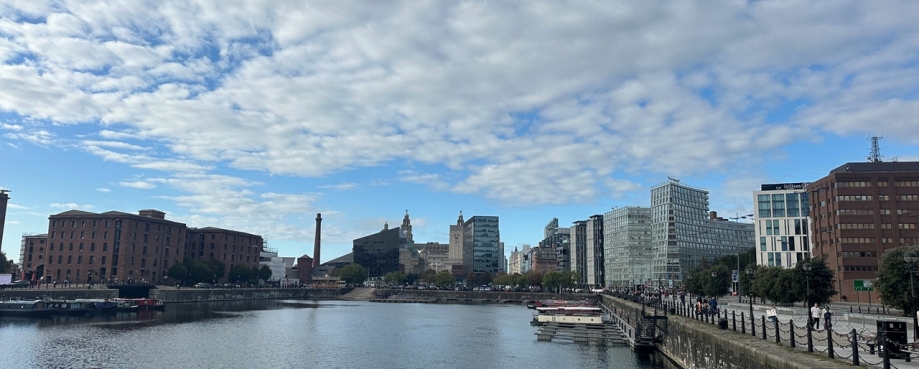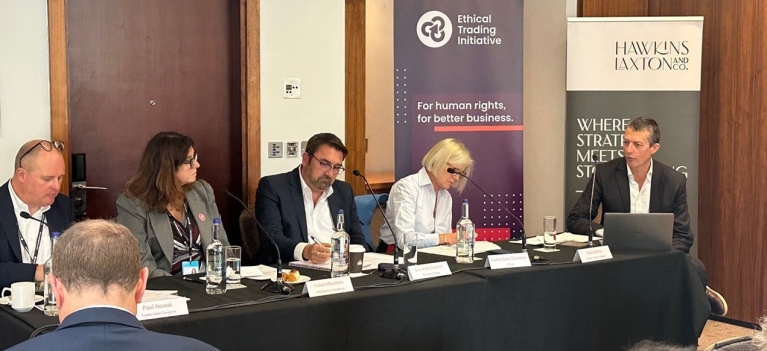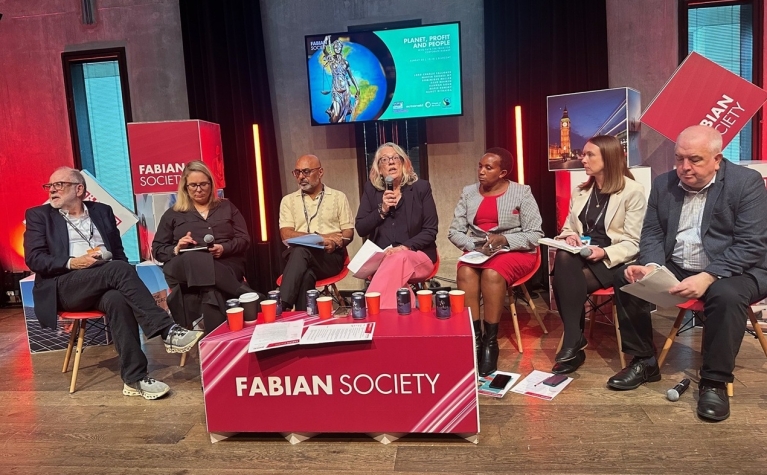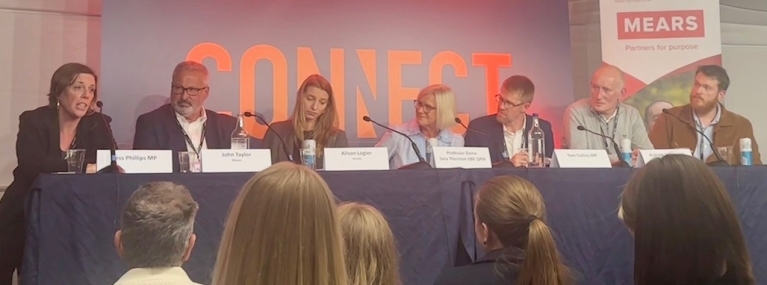
Last month, ETI took part in the Labour Party Conference to engage government, policymakers and partners on the future of UK mandatory Human Rights and Environmental Due Diligence (mHREDD), using the moment to highlight the work ETI and our members are doing to advance human rights in global supply chains.
As part of the Ethical Trading Initiative (ETI) team, I saw first-hand that corporate responsibility and supply chain standards are gaining some traction, but also how the conversation is shifting. The Government’s focus on growth and renewal is clear, but its plans for responsible business are still taking shape. That made it all the more important for ETI to be in the room: to listen, to contribute, and to bring back insights that help our members prepare for what’s next.
Responsibility and growth can go hand in hand
ETI’s official fringe event (the only one at conference with human rights in the title!) brought together a powerful panel of voices from across business, trade unions and civil society. Together, panellists explored what a new mandatory Human Rights and Environmental Due Diligence (mHREDD) law in the UK could bring for both businesses and the people working throughout their supply chains.

ETI fringe event - Good Business: Why mHREDD works for everyone
The discussion was open, pragmatic and grounded in real-world experience. Speakers reflected on lessons from other countries, where mandatory due diligence is setting a clear, level playing field for companies while strengthening protections for workers and supporting supply chain resilience.
Our panel brought together a diverse mix of leaders and perspectives: Paul Nowak, General Secretary of the Trades Union Congress; Helen Moulinos, CEO of Anti-Slavery International; Dame Sara Thornton, Director of Modern Slavery at CCLA and former UK Independent Anti-Slavery Commissioner; David McDiarmid, Corporate Relations Director at Princes Group; and Giles Bolton, Executive Director of the Ethical Trading Initiative.
What stood out was how much agreement there was. Panellists noted that experience from Europe shows businesses prefer clarity over uncertainty. They want a single, consistent framework that recognises and rewards those already acting responsibly.
There was also a shared sense that maintaining the UK’s credibility and competitiveness on the international stage depends on embracing due diligence as a mark of leadership rather than treating it as a regulatory burden.
For ETI and our members, this rings true. Transparency, accountability and respect for human rights and the environment aren’t costs; they’re investments in resilience, reputation and long-term success.
A growing call for action
Our event was part of a wider focus on responsible business. Alongside the Corporate Justice Coalition, Fairtrade Foundation, ActionAid UK and Friends of the Earth, we helped make Sunday at Conference ‘Responsible Business Day’, spotlighting growing political momentum for stronger UK laws that protect workers, human rights, and the environment across global supply chains.

Fringe event - Planet Profit and People: Who pays the price for corporate harms
Speakers including Lord Falconer, Martin Rhodes MP, and representatives from civil society and global supply chains grounded current policy in real-world impact. They explored how corporate harms impact people and the planet, and the policy solutions needed to protect human rights while providing clarity for responsible business. Their message was clear: responsible business is not just a moral imperative, it is central to sustainable growth and a fair economy.
Signs of support
Beyond our own sessions, much of the week was spent listening and contributing to the debates and discussions influencing the responsible business agenda: from trade and growth to ‘clean’ energy. It was encouraging to hear policymakers acknowledge the need to strengthen the UK’s approach to modern slavery and supply chain standards.
Jess Phillips MP, the new Minister for Modern Slavery, spoke about the intention to strengthen existing requirements in the upcoming King’s Speech, signalling renewed attention to the issue. She emphasised the importance of joined up working and collaboration between government, business and civil society.
We also heard strong signals of support from MPs including Tom Collins, Matt Western and Martin Rhodes, who each highlighted the value of practical measures to promote responsible business and protect workers’ rights. Their contributions reinforced how much appetite there is for a constructive conversation on due diligence and accountability.

Fringe event - Modern Slavery: How can a Labour Government improve outcomes for survivors?
A changing policy landscape
Throughout the conference, the focus on economic renewal was clear. The Prime Minister’s keynote speech emphasised a decade of growth, while ministers like Peter Kyle spoke of reducing regulatory burdens by 25%.
That context matters. It means we need to speak the language of opportunity, showing how human rights and sustainability go hand in hand with innovation, investment and productivity. Business leaders on our panel reflected that consumers increasingly expect companies to understand and be accountable for where their products come from and that government can play a critical role in setting clear, consistent expectations across the board.
For businesses already committed to human rights and environmental due diligence, new legislation does not present an additional burden, but rather a way to create a fairer, more consistent playing field. It will be especially valuable if legislation across markets aligns with the UN Guiding Principles on Business and Human Rights, promoting simplicity and harmonisation.
There’s also recognition that the UK’s policy landscape is fragmented. Human rights, trade and business responsibility sit across several Government departments, which can make coordination difficult. But that also opens the door for ETI to build on its already strong relationships in Government and act as a bridge, connecting policy with practice, and business with civil society and unions.
ETI’s Role: Convening for impact
Our event stood out for its mix of perspectives, a genuine dialogue between business, unions and NGOs. Panellists spoke candidly about what’s working and what isn’t in current approaches, and where collaboration could make a difference.
“The power of ETI is in convening,” one participant said. “You bring people to the same table who don’t often get to speak directly to each other.”
That felt true in the room. There was a sense of shared purpose, even among those with different priorities.
Looking ahead
Coming away from Liverpool, I left feeling more hopeful than I expected. My main reflection is that this moment is about building common ground. The Government wants growth, businesses want stability, and civil society wants to ensure that growth benefits people and planet alike. These aims aren’t in conflict, they depend on each other.
Over the coming weeks, we’ll continue following up with MPs and partners across government, business, unions and NGOs. For me, the conference was a reminder of what ETI does best: bringing people together who believe that business can be both successful and ethical.
As the political and economic landscape shifts, our task is to keep making that case, with clarity, evidence and optimism. Because progress on human rights and sustainability doesn’t happen in isolation. It happens when we build common ground.
